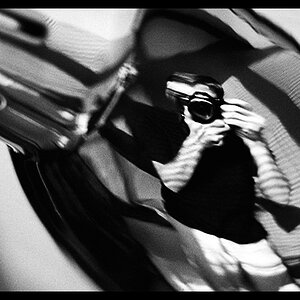Navigation
Install the app
How to install the app on iOS
Follow along with the video below to see how to install our site as a web app on your home screen.

Note: This feature currently requires accessing the site using the built-in Safari browser.
More options
You are using an out of date browser. It may not display this or other websites correctly.
You should upgrade or use an alternative browser.
You should upgrade or use an alternative browser.
focal length
- Thread starter malbec
- Start date
fokker
No longer a newbie, moving up!
- Joined
- Jun 23, 2009
- Messages
- 2,829
- Reaction score
- 295
- Location
- New Zealand
- Can others edit my Photos
- Photos OK to edit
no.
Stosh
TPF Noob!
- Joined
- Jul 18, 2009
- Messages
- 203
- Reaction score
- 0
- Location
- Lancaster, PA
- Can others edit my Photos
- Photos OK to edit
Depends on how complicated you want to get. The simple answer as fokker made short and sweet: "no." If you're using a prime focus lens and there is no internal focusing or internal elements of any kind moving (only the entire lens moves in and out), then definitely no.
With today's more complicated internal focusing lenses, zoom lenses, macro lenses, internally correcting lenses it is possible to have some slight shift in "true" focal length during focusing. But the average user would never know. Just like the average user doesn't realize that his zoom is incorrectly marked for the focal lengths. They are rough estimations and they're even different between 2 identical lenses.
I'm curious why you ask.
With today's more complicated internal focusing lenses, zoom lenses, macro lenses, internally correcting lenses it is possible to have some slight shift in "true" focal length during focusing. But the average user would never know. Just like the average user doesn't realize that his zoom is incorrectly marked for the focal lengths. They are rough estimations and they're even different between 2 identical lenses.
I'm curious why you ask.
UUilliam
TPF Noob!
- Joined
- May 28, 2009
- Messages
- 1,717
- Reaction score
- 2
- Location
- Glasgow
- Can others edit my Photos
- Photos OK to edit
I notice on my 50mm 1.8 when I move the focus ring, It does zoom in slightly / out
However I cannot decide wither this is caused by the subjects being pulled into focus and pushed out of focus creating the illusion of zoom or what...
However I cannot decide wither this is caused by the subjects being pulled into focus and pushed out of focus creating the illusion of zoom or what...
Derrel
Mr. Rain Cloud
- Joined
- Jul 23, 2009
- Messages
- 48,225
- Reaction score
- 18,941
- Location
- USA
- Website
- www.pbase.com
- Can others edit my Photos
- Photos OK to edit
Actually, the answer is often Yes; as a cell-focusing lens focuses closer, it often loses focal length, so many,many lenses like 50mm 1.8 normals from Nikon and Canon,as well as many other non-internal-focusing lenses LOSE focal length as they are focused closer.
On lenses like macro lenses, like the Tamron 90mm AF-SP for example, by the time the lens is focused at its closest focusing distance at 1:1, the actual focal length is around 73mm if my memory serves me correctly.
On lenses like macro lenses, like the Tamron 90mm AF-SP for example, by the time the lens is focused at its closest focusing distance at 1:1, the actual focal length is around 73mm if my memory serves me correctly.
TakenAptly
TPF Noob!
- Joined
- Sep 18, 2009
- Messages
- 32
- Reaction score
- 0
- Location
- Texas, USA
- Can others edit my Photos
- Photos NOT OK to edit
I notice on my 50mm 1.8 when I move the focus ring, It does zoom in slightly / out
However I cannot decide wither this is caused by the subjects being pulled into focus and pushed out of focus creating the illusion of zoom or what...
point the picture is pulled inward.. I just tested it and if you don't move the camera the picture is definitely going to be "closer" depending on the lens focus.
Here's some shots I just took (yeah they're crappy but I'm just trying to show something.)


First is lens turned to focus close, 2nd is a longer focus.
If you look at the lens in the front, when you turn it, it DOES move forward and back. So the lens gets closer and farther away... I'm completely new at photography so these other guys can explain why, but I'm guessing that is what is causing this change.
Stosh
TPF Noob!
- Joined
- Jul 18, 2009
- Messages
- 203
- Reaction score
- 0
- Location
- Lancaster, PA
- Can others edit my Photos
- Photos OK to edit
I'm not sure of the build and focus mechanism of the 50mm f/1.8, but my guess is that the entire lens moves in and out in sync to achieve focus. I have many old manual focus lenses from the old days of film and they all focus this way. Like I said above many newer lenses optimized for different things have internal elements moving with respect to one another which changes the optical "structure" of the lens. This can change true focal length.
As long as all elements move in unison, it's impossible to change the focal length. It's physics. The focal length is what it is. If you see any change in scale it's probably because your subject is so close that you focusing in and out is changing the distance to subject which would of course have a "zoom" effect. The experiment would be more meaningful if your subject was at infinity. And even then it's difficult because the more out of focus something is, the larger it appears, and therefore looks zoomed.
As long as all elements move in unison, it's impossible to change the focal length. It's physics. The focal length is what it is. If you see any change in scale it's probably because your subject is so close that you focusing in and out is changing the distance to subject which would of course have a "zoom" effect. The experiment would be more meaningful if your subject was at infinity. And even then it's difficult because the more out of focus something is, the larger it appears, and therefore looks zoomed.
Dwig
TPF Noob!
- Joined
- Mar 11, 2009
- Messages
- 1,261
- Reaction score
- 1
- Location
- Key West FL
- Website
- happythursday.com
- Can others edit my Photos
- Photos NOT OK to edit
does your focal length change when your lens focuses by extending inward or outward?
If focusing is accomplished solely by extension then the answer is "no".
While the focal length doesn't change, the angle of view will change; it will get narrower as you focus closer.
Focal length is only one factor in calculating angle of view. The primary factors are the image size (film or sensor) and the distance the lens is from the image (measured from the lens' exit pupil to the sensor). This distance from the sensor/film is equal to the focal length plus any extension from the infinity position that is the result of focusing the lens on a closer object.
Most reactions
-
 460
460 -
 291
291 -
 284
284 -
 256
256 -
 219
219 -
 203
203 -
 192
192 -
 185
185 -
 180
180 -
 165
165 -
 153
153 -
 137
137 -
 118
118 -
I
111
-
 102
102
Similar threads
- Replies
- 14
- Views
- 1K
- Replies
- 2
- Views
- 1K
- Replies
- 0
- Views
- 714



![[No title]](/data/xfmg/thumbnail/32/32709-80f0f0432fd5ec548a3efdb60ef77d46.jpg?1619735613)


![[No title]](/data/xfmg/thumbnail/32/32161-a5da499a329f1fae945778aac75d4442.jpg?1619735234)




![[No title]](/data/xfmg/thumbnail/32/32163-b5a5e5cde131a9d14df7f164ab9cb8ab.jpg?1619735234)
